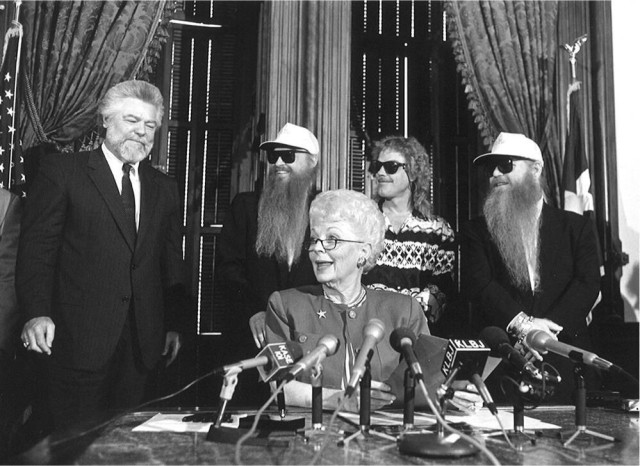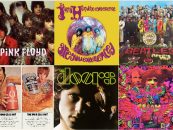Legendary music industry figure Bill Ham – best known as the manager and producer of ZZ Top – passed away in his sleep in Austin, TX on June 20. He was 79 years old. Ham helped create and define the band’s sound since their beginning in Houston in 1969. His modest demeanor lasted through a music industry career that spanned five decades, beginning when he became a Dot Records recording artist with a single produced by Pat Boone.
For nearly 50 years Ham was not only an instrumental part of ZZ Top’s tremendous success, but also helped build Hamstein Music into a successful publishing company. He also discovered and helped engineer the success of country singer Clint Black, who had been singing cover songs in Houston pizza parlors before Ham signed him. In the 1970s Ham also managed major label recording acts Jay Boy Adams and Point Blank.
Born in 1937 in Waxahachie, Texas, Ham began his music career as a record promoter. He had seen a Houston-based group called Moving Sidewalks open a concert for the Doors in 1968 and formed Lone Wolf Management to manage them. Soon after the band’s dissolution, Billy Gibbons, their front man and guitarist, founded ZZ Top with Ham continuing his role as manager. After some personnel changes, the band’s enduring line-up of Gibbons, bassist/vocalist Dusty Hill and drummer Frank Beard solidified and continues to this day, becoming one of the best-selling – with over 50 millions albums sold worldwide – and most enduring bands in rock history. They are the longest-running major rock group to have never changed personnel.
Ham’s vision was critical in shaping their image as “that little ol’ band from Texas.” They signed with London Records in 1970 and he became the group’s producer as well as, on occasion, a songwriting partner.
After their signing with London in 1970, ZZ Top began their march to success. Their third album, 1973’s Tres Hombres, and its hit “La Grange,” catapulted them to success and led to their 1976-77 Worldwide Texas stadium tour, which featured a Lone Star State-shaped stage, a longhorn steer, a buffalo, buzzards and rattlesnakes. It was the biggest and highest grossing rock tour of its day. After it ended, the band took a long hiatus from the road and recording.
In the meantime, Ham negotiated a new contract for ZZ Top with Warner Bros. Records, and by the time the band returned to the stage, Gibbons and Hill had simultaneously grown their now-famous beards. Drummer Frank Beard, despite his name, for the most part stayed clean-shaven.
In 1983 ZZ Top released their milestone album, Eliminator, that included the huge singles “Sharp-Dressed Man,” “Legs” and “Gimme All Your Lovin.” The iconic videos for these songs made the group a key presence on MTV and led the album to become one of the first to receive the Recording Industry Association of America’s Diamond Award, commemorating sales of 10 million albums.
Upon hearing of Ham’s death, the members of ZZ Top issued a brief statement: “We were saddened to hear of Bill Ham’s passing. His early vision and continuing encouragement were invaluable; his efforts and energy will always remain deeply appreciated.”
Gibbons later told the Austin American-Statesman: “Bill had a great eye for enthusiasm,” said Gibbons, reflecting on when he met Ham. “We shook hands, and in fine fashion, he handed me a cigar and said, ‘Son, I’m going to make you a star.’”
Ham’s relationship with ZZ Top ended in 2006. Gibbons was vague when asked for the reason why. “There was a peculiar mandate that appeared that was tethered with a previously undisclosed noncompete clause, and the actual details of that were never quite clear,” he said.
British blues legend John Mayall worked with Ham in the 1960s. At 82 he’s still performing. The Austin paper also spoke to him about Ham. “I remember Bill so well because when I played my very first show in Texas, he took me under his wing and had the courtesy to have me stay at his house,” recalled Mayall. “He showed me what Texas was all about, and that’s how I first met Billy Gibbons, who was jamming in a small club. What happy memories, and I’m saddened by his passing.”
Ham made his first venture into the country market with Black, signing him to RCA Records in 1989, where he helped engineer the then-unknown singer’s meteoric rise to country superstardom while building a Nashville presence for Lone Wolf Management in the process. Black parted ways with Ham in 1992 in what became a messy dispute over royalties and Ham’s management fees.
Throughout his career Ham stayed discreetly in the background, turning down any and all requests from the press for interviews. He was also fiercely protective of the ZZ Top brand, going so far as to forbid the band from jamming in public with any other musicians. (Since ZZ left Ham’s management stable, Gibbons has regularly popped up to play with musicians he likes at clubs and concerts in Austin.) Proud of his Texas roots, Ham was also a behind-the-scenes force for promoting Texas music and its industry, and helped establish an Austin branch of the National Academy of Recording Arts & Sciences, aka NARAS, the Grammy organization.
In 1991, Ham’s wife Cecile was murdered. Her paroled convict killer was caught and ultimately executed by the State of Texas in 2000.
In 1993, with two of the Top 10 touring acts at the box-office, he was named Manager of the Year by Radio & Records magazine.
In addition to owning the music publishing rights to ZZ Top’s catalog, Ham’s Hamstein Music accrued over 100 Top Ten singles in country music, which included 60 #1 records, all penned by writers signed to Ham’s company. In 2002 he sold Hamstein Music’s copyrights and publishing assets to Mosaic Media Group in 2002.
No cause of death was made public.








No Comments so far
Jump into a conversationNo Comments Yet!
You can be the one to start a conversation.